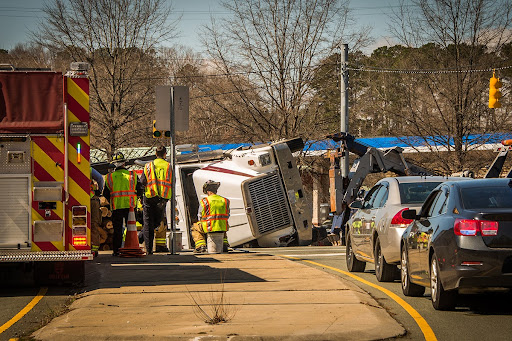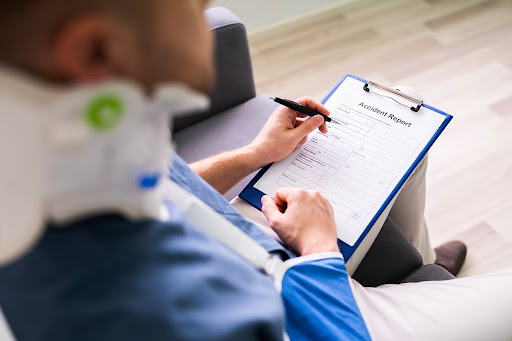Everyone who drives a vehicle should be aware of the laws and regulations in their area. In Atlanta, this includes:
- Adhering to posted speed limits
- Signaling when changing lanes or turning
- Being aware of weather and road conditions
- Wearing safety belts
The traffic on the major roads is a reflection of the reality that Atlanta is a commercial and industrial hub. It is because of this traffic that the chances of being in a motor vehicle accident are high. Car accidents happen quite frequently on the roads, but what about truck accidents?
While car accidents and truck accidents share some similarities, there are some particular differences that you as a motorist should be aware of. In this blog post, we will review some important things you should know about truck accidents.
At the Accident Scene
There are certain steps to take to ensure your safety and wellbeing. After you’ve been in any accident, here is what you should do:
- Check yourself (and others in your vehicle) for injuries
- If possible, move the vehicle out of traffic to a safe area
- Call the authorities
- Receive medical attention
- Document the scene (take pictures, video, notes)
- Collect contact information from other parties, witnesses, and authorities
- Contact a personal injury attorney
Taking these steps ensures you have documentation (evidence) of the accident and your injuries. It is important to keep track of the evidence so that your personal injury attorney can maximize your compensation.
If you feel that you’re at partial fault for the accident, do not speak with other parties involved. Furthermore, anyone involved in the accident should not admit fault. Given the large amount of information, your attorney can help determine fault and respond accordingly.
It is also important to note that the state of Georgia is a modified comparative fault state. According to Georgia Code Title 51, if it is determined that the plaintiff’s fault is less than 50%, then the plaintiff is still entitled to proportionate compensation.
Furthermore, according to Georgia state law, if more than one party is deemed negligent for causing injury to another, other liable defendants are required to pay damages based upon their amount of responsibility.
How Truck Accidents Differ
Due to the nature of trucks, truck accidents can be much more serious than typical car accidents. The severity of injury and vehicle damage can be extensive. Trucks are generally heavier and larger than cars, so the aftermath of accidents is more serious. Because injuries are more severe, recovery time can be lengthy.
It is important to note the differences between average car accidents and truck accidents. After completing the general steps following an accident, there are a few more actions to take.
After exchanging contact information, you should also get the trucking company information in addition to taking note of any serial numbers posted on the truck.
The biggest difference between a truck accident and a car accident is the number of possible defendants. There could be several, given the fact that trucks are commercial vehicles.
Responsible Parties
To receive the compensation you deserve after an accident, you must prove who is at fault. If you’ve been rear-ended by a truck, the damages could be serious, so it’s best to seek compensation to pay the mounting bills.
When filing a personal injury claim against a truck driver, you must demonstrate that the driver and the trucking company are liable for your injuries. The concept is known as vicarious liability.
According to Cornell Law School, vicarious liability is the type of responsibility someone like an employer bears when it comes to an employee’s conduct. When dealing with a truck accident case, you must prove that the consequences were foreseeable and that the driver and the employer are both liable for your injuries.
The trucking company hired the driver to perform a service while operating a company vehicle. Since the driver was in the process of operating a company vehicle during the accident, both the driver and the company could be liable in truck accidents.
Possible responsible parties include:
- The truck driver
- The trucking company
- The truck manufacturer
- The truck repair company
There are some other factors to consider when dealing with the aftermath of a truck accident. If the truck itself is faulty, then you may have a product liability case. If the road where the accident occurred was in disrepair, and the condition caused the accident, you may be able to file a suit against state highway or infrastructure departments.
The nature of personal injury claims and suits can get very complicated. Each case is unique and presents its own set of challenges. What starts off as a truck accident claim could turn into something else entirely. This is why you need a seasoned attorney on your side who knows how to get you the justice–and compensation–you deserve to get your life back on track.
Trucking Laws in Georgia
The state of Georgia does adhere to some general federal laws on trucking. The state follows the Federal Motor Carrier Safety Regulations. The Federal Motor Carrier Safety Administration is the government agency that oversees and regulates commercial trucking safety standards. It is a part of the Department of Transportation.
The FMCSA works to prevent serious injuries, improve technology and safety standards, and keep irresponsible carriers off the road. In addition to setting rules and regulations, they also provide statistical information on road safety, answer frequently asked questions, and conduct case studies.
In addition to following the federal regulations, Georgia also has laws regarding truck driver age. Truck drivers in Georgia must be 18 to receive an instructional permit or commercial vehicle license. This rule applies only within the state of Georgia.
This means that the licensed commercial vehicle driver can only drive within the state. Once they turn 21, they are then permitted to cross state lines.
If You’ve Been in a Truck Accident
If you’ve suffered an injury in a truck accident, you should receive the compensation you need to get back on your feet. Truck accident injuries can be serious and take lengthy recovery time. The process could take weeks or even months. This might include:
- Hospital stays
- Medications and medical supplies
- Multiple doctors’ visits
- Rehabilitation and physical therapy
This list only includes medical issues. Following a truck accident, your car might need extensive repairs. If the accident is serious enough that your car is totaled, you could have to purchase a new car altogether. If that is the case, the bills will begin to pile up quickly.
All of these issues could also impact your ability to work (and get to work). This means that you would need funds to pay for general living expenses in addition to the medical and car bills.
These obstacles could seriously affect you and your family’s wellbeing. Navigating the personal injury world, going up against large trucking companies, and dealing with insurance companies is challenging. You shouldn’t have to go through this process alone.
If you’ve been injured, call us at the Nick Schnyder Law Firm today. Going through this process requires an experienced fighter who knows how to get the insurance companies to pay up. Reach out and receive a free consultation of your case: (404) 999-1111. Nick Schnyder the Injury Fighter is in your corner and ready to fight for your rights.




